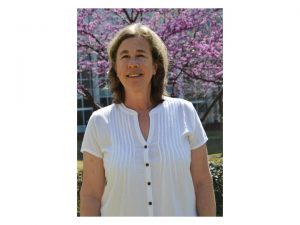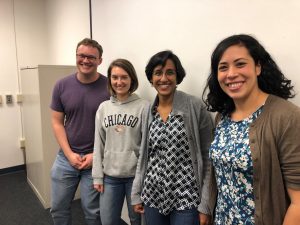ASPB established the Plant Biology Learning Objectives, Outreach Materials, & Education (Plant BLOOME) grant program with the goal to enhance public awareness and understanding of the essential roles of plants in all areas of life (http://bloome.aspb.org). Congratulations to the 2019 ASPB Plant BLOOME grant recipients!
Bringing Plants to Life Through Theatre Arts
PI: Carol Goodwillie, East Carolina University

The most satisfying part of my career so far has been to watch students get “turned on” to plants. In a new collaboration with Patricia “Patch” Clark, a professor of theatre education, we hope to make that process happen for undergraduates, children, and citizens in our community by bringing theatre to plant biology education. At the centerpiece of the project, undergraduate students in a plant biology course will work with theatre education students to develop a play for children about trees, their biology, and the important ecosystem services they provide. To reach a diverse audience, our play will be performed in local public schools, at a community center, and at a science education center. How many children have played a silent tree as an extra in a school play? Now trees will play the starring role.
Undergraduate biology students will solidify their understanding of plant biology as they teach theatre students about the scientific content of the play. Knowledge of plants gained by theatre education students will serve them in future K-12 careers. In working together, we anticipate that both groups of students will gain new perspectives, ways of thinking and communicating.
We propose that theatre can be an effective way to convey some of the more complex topics in plant biology. Even abstract concepts such as carbon cycling and water potential might be conveyed through drama and movement. In addition to developing theatre for children, we will use students in the playwriting class as an “incubator” to develop improvisational drama exercises that can be integrated into undergraduate courses in plant biology to teach difficult concepts. We’re looking forward to all that we’ll learn in this collaboration and greatly appreciate the support of the Plant BLOOME program!
Alleviating the Outreach Drought with Scientists in the Classroom
PI: Loralee Larios, University of California Riverside

The formidable years of middle school are often defined by the social challenges that students face, but a less-known fact is that these years are also critical for the STEM trajectory of a student. A key element to encourage scientific literacy at this pivotal age is promoting educational experiences that enhance a student’s self-efficacy, that is their self-confidence in their ability to successfully conduct STEM activities. Complementary to these efforts is the need to bridge the gap between those people who do science as a living and students who are learning science.
Therefore, our outreach program has three main goals: 1) improve science literacy and plant science awareness with plant science lab activities, 2) increase middle school students’ self efficacy and identity in STEM, and 3) increase interactions between plant scientists and students. We aim to achieve these goals by developing a sustained partnership among teams of undergraduate and graduate students/postdocs, a teacher, and middle school students over the course of the school year. As part of this partnership, our teams will visit a class on average once a month throughout the school year and present a series of exercises that help them explore plant biology within the context of the pressing challenge of drought facing southern California.
As plant scientists, we earnestly try to understand the impacts of drought from the cellular level to the ecosystem level to provide more insights into how drought stress can impact a range of services – from crops to biodiversity in both urban and natural settings. As citizens, we are asked to conserve water and be ‘water-wise’, but too often the science motivating ‘water-wise’ decisions is omitted in these discussions. Drought, therefore, provides a unique backdrop to our classroom activities that promote student scientific literacy within plant biology, where students will be directed to explore how plants cope with stress from the cellular to ecosystem level, contextualizing these experiences within a genuine challenge they face in their day-to-day lives. We are excited about implementing this plant-biology focused outreach program to improve middle school students’ scientific literacy in plant sciences and self-efficacy in STEM as well as help bridge the gap between people doing science and learning science.

Increasing minority student recruitment to plant sciences by enhancing high school curriculum through teacher training workshop
PI: Rupesh Kariyat, University of Texas Rio Grande Valley
Recent statistics show that there is a huge demand for skilled workforce in plant and agricultural sciences. Most studies and opinions in this regard have focused on recruitment efforts at undergraduate, graduate and post graduate levels, often ignoring a fast-growing majority – the high school students. Steering these fresh graduates into plant, agricultural and food sciences will be a massive boost to addressing the current shortage of workforce in this area. To compound these issues, the teachers responsible for guiding and educating this young workforce have received little attention. And, we are also aware that research and education in these fields lack students from minorities and underrepresented groups.
Through the Plant BLOOME award, I plan to address these concerns by recruiting plant science teachers (Agriculture and Plant Biology) from the Pharr-San Juan-Alamo Independent School District (PSJA ISD) in the Rio Grande Valley of South Texas to participate in a boot camp style intense workshop at the University of Texas Rio Grande Valley (UTRGV). UTRGV and the Rio Grande Valley are on the border of USA-Mexico and have a very high Hispanic population. In fact, UTRGV has >90% Hispanic student enrollment. PSJA ISD is a state and national leader in creating more academic opportunities for all students, and the school district offers pre-kindergarten through twelfth-grade curriculum with around 32,000 students. The main objective of the project is to train high school teachers in plant sciences from PSJA ISD and assist them in updating their curriculum using active learning methodologies and hands-on work experience. The basic outline of the workshop includes classroom-based lecture style teaching during mornings (8:30 am to 12:00 pm), followed by a hands-on experiential learning exercise (lab/field). Each day will be led by a faculty with expertise in one of the major areas of Agriculture, Food, and Plant Sciences. After six days, the faculty and the teachers will sit together and revise the current curriculum to include a hands-on activity. The eight teachers will receive a certificate of completion, and distance learning credits applicable towards their annual review and promotion at PSJA ISD. The long-term impact of the project will be evaluated based on the student interest in agriculture and Science, Technology, Engineering and Mathematics (STEM) related career fields (for example, using statistics from PSJA ISD, UTRGV, and other post-secondary enrollments). In addition, the size/student numbers taught will be tracked to gauge the number of students introduced to plant science-agriculture related topics.
The project is unique since this is the first ever attempt by UTRGV and PSJA ISD to coordinate a workshop that focuses on teacher education in plant sciences focused curriculum, the high school teachers get an opportunity to work and learn from faculty members that conduct cutting edge research in various aspects of plant sciences (insect-plant interactions, plant physiology, weed ecology, soil biology, food microbiology, and agroecology), and the workshop will generate critical data on student and teacher learning outcomes to be used for further improvement of curriculum.
